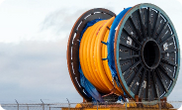Everything About Marine Wire- Its Types And Applications

There are various classifications of marine wire and cable available on the internet, but not all of them might answer your needs. Here is the short classification of marine cables that makes it relatively easy to get what you need, including type P cables, Pendflex pendant cables, and many others. We will settle the differences between marine and shipboard cables once and for all.
What is marine wire and cable?
Simply put, marine wire and cable are the cables for applications in the marine, including seas and oceans. These cables have excellent water resistance, in particular saltwater. They also have excellent protection from corrosion. To ensure such protection, most marine copper cables use tinned copper conductors. Another common name for marine cables is marine-grade wire.
Types Of Marine Wire and Their Applications
Type P Cable is an industrial marine cable used in the harshest marine environments, including offshore drilling rigs and petroleum production. These cables have cross-linked polyefilin insulation resistant to sun, flames, and oil. The cable is sturdy, has a unique thermoset system, and has a high-temperature range.
Pendflex Pendant Cable is a control cable perfect for cranes, hoists, and pendant systems. What differentiates it from other applications is its excellence for flexing. This cable is classified as an industrial one.
250-3 Type G-GC is used in marinas for dock and boat supply and grounding. Type G wire is approved for direct burial and submersion in water.
THOF 90°C Flexible 600V Ship-to-Shore Power Cable is a tough and crash-resistant watertight cable for ship-to-shore applications with EPR insulation and CPE jacket.
Marine and Shipboard Cables: These terms are often used interchangeably, even though "marine cable" can be used as a more general term, whereas a shipboard cable always means the one used on the board of the ship. These cables are used for various broad purposes, including control circuits, power circuits, and communication.
Different abbreviations mean different uses of shipboard cables:
- Type N (T/N) rating means that the cables are for multipurpose applications on commercial vessels.
- Types TPS, NI, and XT cables are for commercial ships stationed outside of the United States.
- Shipboard cables can optionally have armor or shielding. Armored cables can be differentiated by the letter A at the end of the cable's name, while unarmored have the letter U.
- Letters HOW at the end of the cable's name mean that the cable has superior oil resistance.
- Shipboard cables can be flexing or non-flexing, which impacts their applications.
- There are also cables with low-smoke zero-halogen LSZH jackets to protect the ship's environment from the harmful impact of gasses in the event of a fire.
- Some insulations follow military standards, making cables perfect for military vessels.
- Various shipboard cables come in 150, 300, and 600 V voltages.
- Some wires are specifically labeled for mission-critical environments.
- Common insulations for shipboard cables are PVC, XLPE, silicone rubber, and EPR.
- Thermocouple shipboard cables possess a temperature range of –270 C to 1260 C.
Marine Wire Types Illustrated

Nassau National Cable is a well-reputable wire and cable marketplace that sells thousands of marine wire and cable mentioned above and many more from trusted manufacturers all across the world, including well-known US brands. Thanks to our wide range of suppliers, the prices on high-quality cables are truly superb. Our 24/7 support team will make sure that you will choose the best cable for your particular application.
















